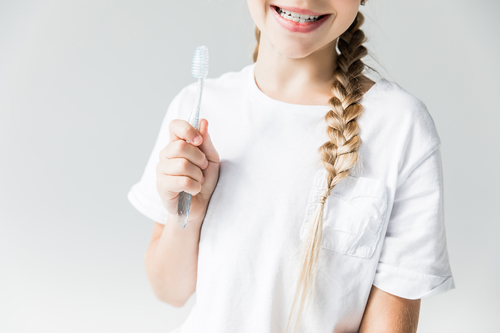Toothbrush Tips for Cold and Flu Season
Cold and flu season has arrived, and we bet you've stocked up on cough drops, tissues, and hand sanitizer. But have you thought about your toothbrush? While proper toothbrush hygiene...

Maintaining a healthy, white smile begins at a young age. The enamel on your teeth is subject to stains, erosion and tooth decay from the foods we eat and beverages we drink. If you are a parent who takes care of their own teeth and whitens on a regular basis, you may be wondering how to keep your child’s smile as healthy and white as yours is.
There are a number of teeth whitening solutions available for children that don’t even require the purchase of any oral hygiene products to whiten. For kids, these are the most effective ways in which they can preserve their enamel and maintain a healthy smile naturally.
The first rule in whitening products for children is if your child still has baby teeth, it is not recommended. Children under the age of 16 should avoid any over-the-counter whitening products because they contain high levels of hydrogen peroxide that may be too strong, causing harm to their tooth enamel. Damage to tooth enamel can cause irreversible yellow teeth because your enamel can never be repaired or replaced.
If your child wants to achieve a whiter smile, there are natural and safe ways of preserving the whiteness of their enamel without using chemicals or bleach. Help them to achieve a sparkling white smile with these natural alternatives to teeth whitening products.
Brushing twice a day with a pea-sized amount of whitening toothpaste and fluoride will help remove starch and sugars from their teeth, keeping them as white as possible. As soon as a child has two teeth that actually touch it’s important to show them how to floss properly to remove plaque which can coat the teeth and make them appear yellow.
Beyond being good for your health, eating a diet rich in hard fruits and vegetables can also help to clean and whiten teeth. Foods including celery, carrots, apples, and pears can help to remove surface stains from teeth.
The biggest culprits of tooth decay are sugar and acidity found in foods and beverages. Limiting or eliminating these from your child’s diet is a good way to help preserve enamel and keep teeth white.
Children should see a dentist regularly by age 1, according to the American Dental Association. Seeing a dentist regularly for dental exams will help to prevent future cavities and keep teeth clean and healthy with regular dental cleanings.
Don’t forget to schedule your pediatric dental exams every six months with Dr. Baudean and General Dentistry.